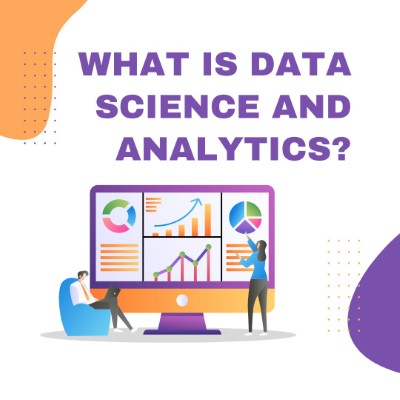In 2024, data science remains one of the most promising and lucrative career paths. As organizations across industries continue to recognize the value of data-driven decision-making, the demand for skilled data scientists is at an all-time high. Let’s first know about data science and analytics in simplest way.
What is Data Science and Analytics?
Data Science and Analytics is the field that involves extracting valuable insights from large volumes of data. It combines statistics, computer science, and domain knowledge to analyze and interpret complex data sets. The goal is to turn data into actionable knowledge that can help organizations make informed decisions.
How Did Data Science and Analytics Come to Existence?
Data Science emerged from the convergence of several fields:
- Statistics: The foundation for analyzing data.
- Computer Science: The ability to process and manage large datasets.
- Domain Expertise: Understanding the specific context of the data.
As businesses and organizations began generating more data from various sources like the internet, sensors, and transactions, the need to manage and analyze this data grew, leading to the development of data science.
Evolution of Data Science
- Early 2000s: Data warehousing and business intelligence were the primary methods for managing and analyzing data.
- Mid-2000s: The rise of big data technologies like Hadoop allowed for the processing of massive datasets.
- 2010s and Beyond: Advances in machine learning and AI have further enhanced data science, enabling more sophisticated analysis and predictive modeling.
Relationship with AI and Machine Learning
- AI (Artificial Intelligence): The broader concept of machines being able to carry out tasks in a smart way.
- Machine Learning (ML): A subset of AI that involves the use of algorithms and statistical models to enable computers to learn from and make predictions based on data.
- Data Science: Encompasses AI and ML as tools to analyze and interpret data. Data science uses ML algorithms to build models that can predict future trends or behaviors.
Getting Started with Data Science as a Career
- Learn the Basics: Start with foundational courses in statistics, programming (Python/R), and data visualization.
- Online Courses: Platforms like Coursera, edX, and Udacity offer specialized courses in data science.
- Practical Experience: Work on projects, participate in Kaggle competitions, and build a portfolio.
- Advanced Learning: Learn machine learning, data engineering, and domain-specific applications.
Self-Learning Through Online Courses
Yes, you can definitely get started with self-learning. Here are some recommended resources:
- Coursera: Data Science Specialization by Johns Hopkins University.
- edX: Data Science MicroMasters by University of California, San Diego.
- Udacity: Data Scientist Nanodegree.
- Kaggle: Free datasets and community-driven data science projects.
How Do Companies Hire Data Scientists?
- Skills Assessment: Companies look for proficiency in programming (Python, R), statistics, machine learning, and data visualization.
- Portfolio: Demonstrating practical experience through projects and contributions to open-source projects can be very valuable.
- Interviews: Technical interviews often include problem-solving, coding tests, and case studies.
- Education: While a degree in computer science, statistics, or a related field is beneficial, practical skills and experience can sometimes substitute for formal education.
Is a Degree Required?
Not necessarily. Many data scientists come from diverse educational backgrounds. However, having a degree in a related field can be advantageous. Practical experience, certifications, and a strong portfolio can also help you stand out.
Freelancing Opportunities
Yes, there are ample opportunities to work as a freelancer in data science. Many businesses, especially startups and small companies, look for freelance data scientists to help with specific projects. Platforms like Upwork, Freelancer, and Toptal offer numerous opportunities for data science freelancers.
Data Science as a Career in 2024
Here are some key aspects of pursuing a career in data science in 2024:
High Demand and Job Opportunities:
- Data science roles are abundant in various sectors, including technology, healthcare, finance, retail, and government.
- Companies like Google, Amazon, Facebook, and numerous startups actively seek data scientists to leverage their vast amounts of data.
Skillset and Tools:
- Proficiency in programming languages such as Python and R is essential.
- Knowledge of machine learning algorithms, data visualization tools (e.g., Tableau, Power BI), and big data technologies (e.g., Hadoop, Spark) is highly valued.
- Statistical analysis, data wrangling, and problem-solving skills are crucial for interpreting data and providing actionable insights.
Education and Training:
- While a formal degree in computer science, statistics, or a related field can be beneficial, practical experience and specialized training often hold equal weight.
- Online learning platforms like Coursera, edX, and Udacity offer comprehensive courses and certifications in data science.
Freelancing and Remote Work:
- The flexibility of freelancing and remote work has expanded in the data science field. Many companies and startups prefer to hire freelance data scientists for specific projects, providing opportunities for remote work.
- Freelance platforms like Upwork, Freelancer, and Toptal offer numerous job listings for data science professionals.
Future Prospects:
- As artificial intelligence and machine learning technologies advance, the role of data scientists will become even more integral in developing and deploying these systems.
- Continuous learning and staying updated with the latest tools and techniques are essential for career growth in this rapidly evolving field.
Conclusion
Data science is a dynamic and evolving field with significant career opportunities. With the right mix of education, practical experience, and continuous learning, you can build a successful career in data science, whether you choose to work for a company or as a freelancer.
A career in data science in 2024 offers immense potential for growth, innovation, and high earning potential. With the right mix of technical skills, practical experience, and a proactive approach to learning, data scientists can significantly impact how organizations harness the power of data to drive their success.
